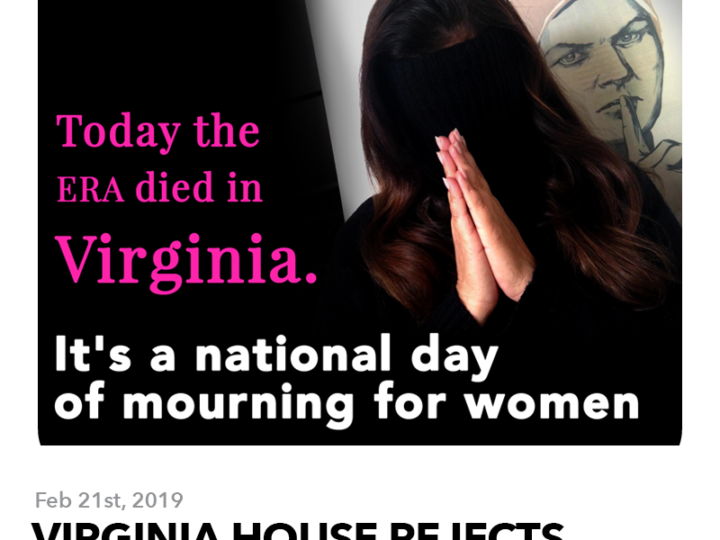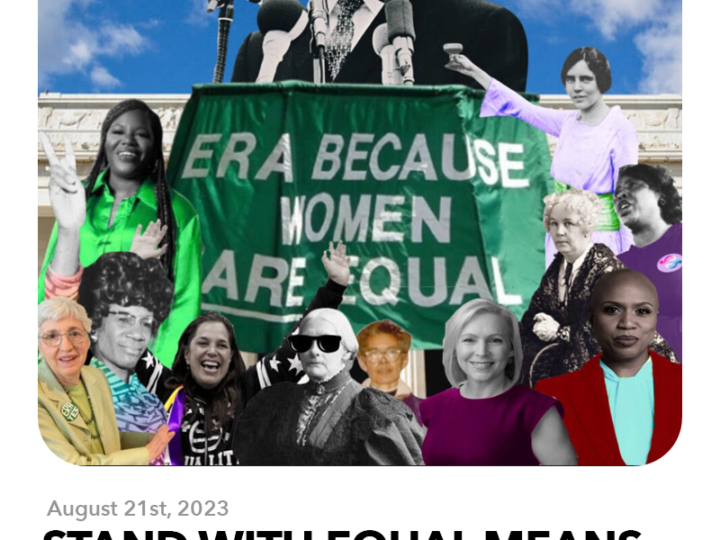Bloomberg Law and the Boston Herald both singled out the EME case on behalf of the Equal Rights Amendment on Friday in separate articles, building on the growing momentum around pressuring the Biden/Harris administration to publish the ERA.
Here are the articles in full:
Equal Rights Amendment takes center stage as pivotal case advances in federal court
By MARIE SZANISZLO | Boston Herald
Under President Biden, the Department of Justice is blocking the Equal Rights Amendment from becoming the 28th amendment to the Constitution, just as the DOJ did under President Trump, an attorney who argued the case this week in federal court in Boston said.
“This is one of the most important women’s rights cases in the history of this country,” Wendy Murphy told the First Circuit Court of Appeals on Wednesday. “Nothing matters more than constitutional equality because all women’s rights rise or fall based on whether women can expect equal protection of those rights when they seek to enforce them.”
An amendment proposed by Congress becomes law when three-fourths of the states vote to ratify it. Virginia last year became the 38th and final state needed to ratify the ERA, which states, “Equality of rights under the law shall not be denied or abridged by the United States or by any state on account of sex.”
But under the direction of Trump Attorney General William Barr, U.S. Archivist David Ferriero refused to publish the ERA as the 28th Amendment, blocking it from becoming law, said Murphy, the attorney representing Equal Means Equal, a national organization that educates legislators and the public about the ERA. Now, Ferriero is doing the same under Biden Attorney General Merrick Garland, she said.
“Many women were hopeful that when Biden was elected he would undo Trump’s blocking of the ERA,” Murphy told the Herald. “Instead, Biden has taken the exact same position as Trump against it.”
At Wednesday’s hearing before the First Circuit Court of Appeals, she said publication of the ERA is crucial because it would force states to begin to identify and repair any sexually discriminatory laws and policies that now block women’s equal treatment.
However, Department of Justice lawyer Thomas Pulham argued that Equal Means Equal had no standing to file suit.
“Even if some of the states had to change laws, that wouldn’t create standing for individuals or organizations that just have a generalized interest in what they view as the proper application of the law,” Pulham told the court.
Murphy, however, argued that the U.S. archivist unlawfully interfered with the ERA’s validity by failing to publish it.
“That is a barrier that … gives all women standing,” she told the court. “If women don’t have standing to challenge that, who does?”
” ‘Equal Justice Under Law’: These words are inscribed on the outside of the Supreme Court. But when women see or hear these words, we know they don’t apply to us,” Murphy said. “Five women a day are killed by men in this country, and disproportionately high numbers of women are raped, beaten and abused by men every year because these words do not apply to us.”
“This is an unconscionable affront to core American values, and it belies the Supreme Court’s inscribed promise of ‘Equal Justice Under Law,’ ” she said. “This court has an historic opportunity to end the hypocrisy and endow all people in this country once and for all with the dignity of basic human equality.”
Equal Rights Amendment Plaintiffs’ Standing Debated on Appeal
Chris Marr, Bloomberg Law
Equal Rights Amendment supporters, seeking revival of their fight to add that provision to the U.S. Constitution, confronted a federal appeals court panel Wednesday questioning their legal standing to pursue the case.
The advocates are ultimately looking for a court order that would recognize the amendment as fully ratified. But U.S. Archivist David Ferriero, whose job includes publication of constitutional amendments, has declined to officially recognize the ERA on the grounds that its 1979 ratification deadline passed long before Illinois, Nevada, and Virginia became the last three states needed to approve the addition.
The lawsuit, filed by the ERA advocacy groups Equal Means Equal and The Yellow Roses, plus an individual Katherine Weitbrecht, was dismissed last year by a U.S. district judge in Boston. Backers are asking the U.S. Court of Appeals for the First Circuit to reinstate it.
The Boston-based three-judge panel spent most of the nearly hour-long proceeding focused on whether the plaintiffs can clear the legal hurdles for suing Ferriero, such as showing his actions caused them a particular, concrete injury that is redressable by the court.
“This court has an historic opportunity to end the hypocrisy and endow all people in this country once and for all with the dignity of basic human equality,” plaintiffs attorney Wendy Murphy of Boston told the First Circuit during Wednesday’s hearing.
The case is one of two now pending in federal appellate courts seeking recognition of the ERA. The attorneys general of Illinois, Nevada, and Virginia this week appealed the March dismissal of their similar suit by a U.S. district judge in Washington.
Sent to the states for ratification by Congress in 1972, the proposed addition declares, “Equality of rights under the law shall not be denied or abridged by the United States or by any State on account of sex.” If its supporters are successful, the ERA would become the 28th Amendment to the Constitution.
The Need to Show Injury
Murphy and her co-counsel Alison Shea argued all women face an injury due to the archivist’s refusal to publish the ERA. If he had published it, states would have begun the work of fixing laws and policies that are discriminatory to women after Virginia’s final ratification vote in January 2020, Murphy told the court.
“States are not doing that repair work because of the archivist,” Murphy said. “If women don’t have standing to challenge that, who does? That really is the critical question here.”
The argument falls short of the legal requirement that plaintiffs show a particularized concrete injury, said Thomas Pulham, a U.S. Justice Department attorney arguing on behalf of the archivist, Ferriero.
“They rely on the kind of abstract social interests, for example an interest in the validity of the ERA,” he told the court.
Shea also argued the advocacy groups themselves, including Equal Means Equal, have suffered organizational injury because they’ve been forced to divert resources from their primary mission.
U.S. Circuit Judge Sandra L. Lynch questioned the organizational standing argument.
“Your opponent says there was no diversion away from the primary mission of your organizations. If anything there was an intensification of effort,” Lynch told Shea.
Equal Means Equal was previously focused on educating the public and advocating for passage of the Equal Rights Amendment, Shea said. But since the archivist’s refusal to publish the amendment, the group has shifted to legal challenges and to educating the public on the role of the archivist.
“I understand that’s a fine line,” Shea said. “But I think the real question is to ask: what is the education about?”
Multi-Front Dispute
The fight over the Equal Rights Amendment is being fought simultaneously in Congress. The House’s Democratic majority passed a resolution in March that attempts to undo the congressional deadline for ERA ratification. A similar resolution is pending in the Senate, where its Democratic sponsors would need to win the support of at least 10 Republicans.
The ERA faces broad Republican opposition in Congress, as well as opposition from Republican state attorneys general in Alabama, Louisiana, Nebraska, Tennessee, and South Dakota who intervened in the D.C. lawsuit to argue against the amendment’s recognition.
Conservatives contend the measure is unnecessary because other federal laws already ensure equal legal treatment on the basis of sex, and Alabama’s AG has said the ERA would invite a flood of legal challenges to state laws such as abortion restrictions that have previously survived constitutional challenges.
Not the Last Word
If the dispute over the amendment isn’t resolved by then, January 2022 could bring a new wave of lawsuits that seek to enforce the amendment’s effects of barring discriminatory state and federal laws, said Linda Coberly, managing partner at Winston & Strawn’s Chicago office who previously filed a brief in favor of the Virginia AG’s case.
That’s because the amendment’s language says it takes effect two years after ratification, so ERA supporters see the two-year anniversary of the Virginia legislature’s ratification vote as its effective date, she said.
“As of today, no one can sue to enforce their rights under the ERA, even if the ERA is part of the Constitution,” which is why the current cases focus on the archivist’s certification of the amendment, Coberly said.
Those cases likely will be another avenue for courts to decide whether the amendment has been properly ratified or has failed because of the deadline.
Joining Lynch on the panel for Wednesday’s arguments were First Circuit Chief Judge Jeffrey R. Howard and Judge David J. Barron.
The case argued Wednesday is Equal Means Equal v. Ferriero, 1st Cir., No. 20-01802, oral arguments held 5/5/21
EME is planning our next townhall to keep the conversation going about next steps — legal, political, social – for the ERA.
Thank you for your continued support; our members make the fight possible.
With love,
Kamala, Natalie, Wendy, Thila and the EME Team
PS: Your generous tax-deductible contributions are an investment in our results-driven organization on the frontlines of the fight for equality. Any amount is greatly appreciated, but for donations of $500 or more we’ll send you our exclusive (and very popular!) handmade Equal Means Equal hoodie as a special thank you.
Finally, please donate to us. Equal Means Equal is committed to fighting for the ERA, but with litigation and public education expenses, we really need your financial help now. Please donate $28, or as much as possible, to get us to the finish line, recurring monthly if you can. If we don’t get the ERA in the Constitution soon, we likely won’t see it added in our lifetimes. We need to put our adrenaline to work now. Together, we can do this! We have a very small window of opportunity to make this happen – probably two to four weeks. So let’s do it.




